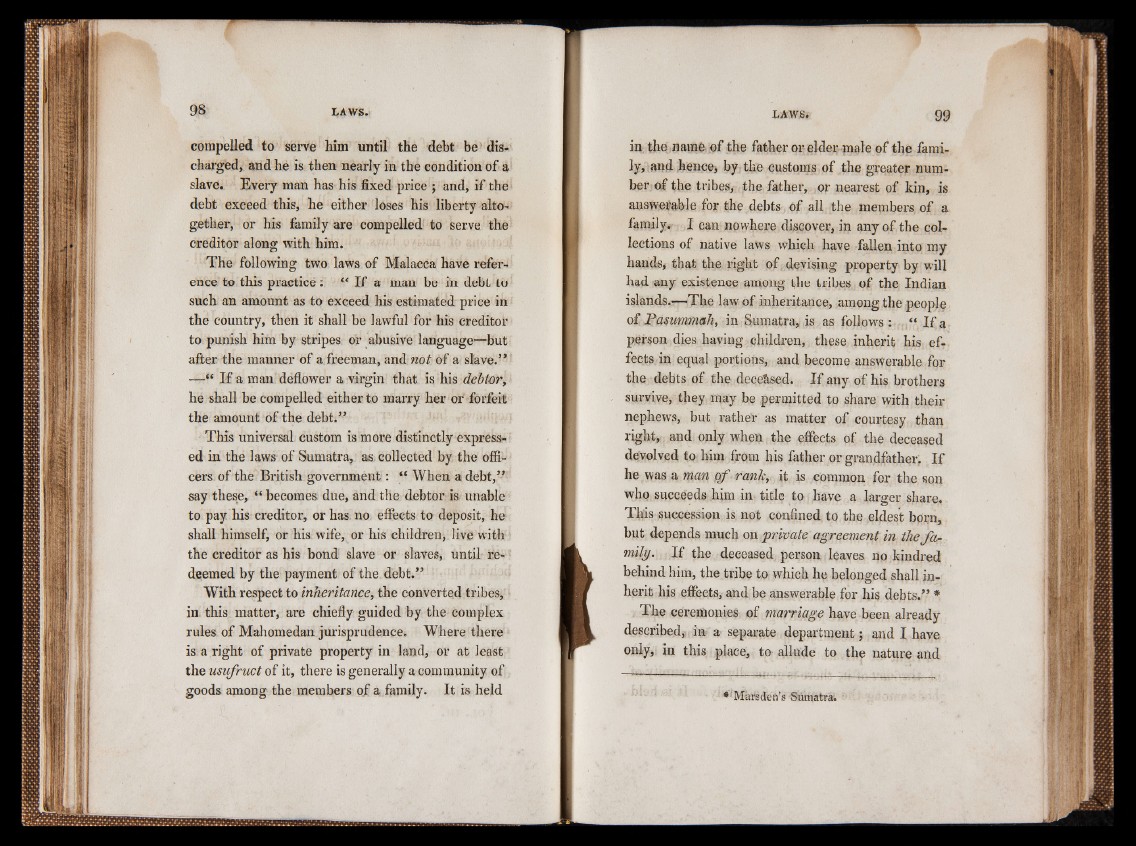
compelled to serve him until the debt be discharged,
and he is then nearly in the condition of a
slave. Every man has his fixed price ; and, if the
debt exceed this, he either loses his liberty altogether,
or his family are compelled to serve the
creditor along with him.
The following two laws of Malacca have reference
to this practice: “ If a man be in debt to
such an amount as to exceed his estimated price in
the country, then it shall be lawful for his creditor
to punish him by stripes or abusive language—but
after the manner of a freeman, and not of a slave.”
—“ If a man deflower a virgin that is his debtor,
he shall be compelled either to marry her or forfeit
the amount of the debt.”
This universal custom is more distinctly expressed
in the laws of Sumatra, as collected by the officers.
of the British government: “ When a debt,”
say these, “ becomes due, and the debtor is unable
to pay his creditor, or has no effects to deposit, he
shall himself, or his wife, or his children, live with
the creditor as his bond slave or slaves, until redeemed
by the payment of the debt.”
With respect to inheritance, the converted tribes,
in this matter, are chiefly guided by the complex
rules of Mahomedan jurisprudence. Where there
is a right of private property in land, or at least
the usufruct of it, there is generally a community of
goods among the members of a family. It is held
in the name of the father or elder male of the family,
and hence, by the customs of the greater number
of the tribes, the father, or nearest of kin, is
answerable for the debts of all the members of a
family. I can nowhere discover, in any of the collections
of native laws which have fallen into my
hands, that the right of devising property by will
had any existence among the tribes of the Indian
islands.—The law of inheritance, among the people
of Pasummak, in Sumatra, is as follows : , If a
person dies having children,, these inherit his effects
in equal portions, and become answerable for
the debts of the deceased. If any of his brothers
survive, they may be permitted to share with their
nephews, but rather as matter of courtesy than
right, and only when the effects of the deceased
devolved to him from his father or grandfather. If
he was a man of rank, it is common for the son
who succeeds him in title to have a larger share.
Tftis succession is not confined to the eldest born,
but depends much on private agreement in thefa~
mill/. If the deceased person leaves no kindred
behind him, the tribe to which he belonged shall inherit
his effects, and be answerable for his debts.’’ *
The ceremonies of marriage have been already
described, in a separate department; and I have
only, in this place, to allude to the nature and
*' Marsden’s Sumatra'.